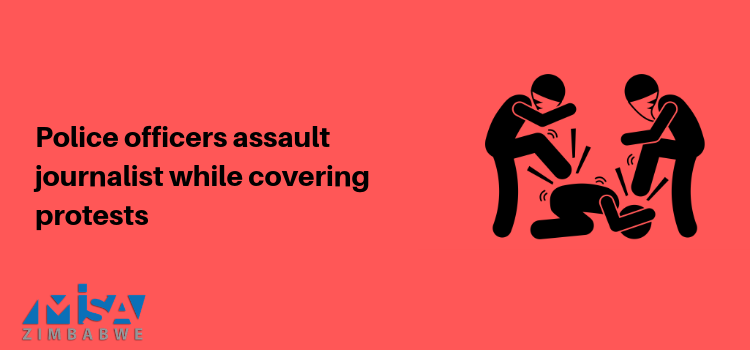Zimbabwe Republic Police (ZRP) anti-riot officers assaulted Talkmore Fani Mapfumo a local journalist with online publication Zim Morning Post today, 16 August 2019, in Harare for filming the police officers when they were dispersing protestors in the Central Business District (CBD).
In a video clip, taken by his fellow workmate, the officers in full anti-riot gear are seen charging at Mapfumo demanding him to stop filming. The journalist produced his accreditation card before the officers took turns to assault him with baton sticks.


In the stills from a video: Mapfumo in striped T-shirt being assaulted by police
(Source: TechMag.TV)
One of the officers is recorded shouting, “…being a journalist will not spare you from beatings”. The assaults only stopped when Mapfumo broke loose and ran for dear life.
Government’s response to protests exposes insincere reform agenda
The government’s heavy-handed response to the protests in Harare today is evidence that the ongoing media law reform process is an attempt to buy international goodwill without implementing meaningful change to government’s disdain for the fundamental rights to free expression and the right to freedom of assembly and association.
The current government has distanced itself from the unconstitutional practices that characterised the Mugabe-led administration. From a media freedom perspective, part of that administration’s worst crimes against the media was the gazetting of the Access to Information and Protection of Privacy Act (AIPPA) and the Public Order and Security Act (POSA).
AIPPA criminalises journalism and restricts the right to access to information. On the other hand, POSA directly attacks the right to freedom of association and assembly as well as the right to demonstrate and petition. These laws have remained in Zimbabwe’s statute book, brazenly opposing the fundamental rights set out in sections 57, 58, 59, and 61 of the Constitution that came into effect in 2013.
Buckling under local and international pressure, the current government conceded that both laws were no longer fit for purpose. MISA Zimbabwe and other media freedom advocates welcomed the current government’s announcement to repeal both AIPPA and POSA. MISA Zimbabwe further took up the government’s invitation to contribute to the media law reform process by giving guidance on model laws to protect, promote, and regulate media freedoms in the country.
Under the Inter-Ministerial Taskforce initiative, the government set out to replace POSA with the Maintenance of Peace and Order Bill and replace AIPPA with three laws that would separately regulate access to information, protection of privacy and the regularisation of the establishment of the Zimbabwe Media Commission.
However, when the Maintenance of Peace and Order Bill was gazetted, it bore an uncanny resemblance to the condemned POSA, if not worse. This was the first indication of the government’s lack of sincerity when it came to law reform. This was further confirmed when the Freedom of Information Bill and the Zimbabwe Media Commission Bill were gazetted. There were no fundamental changes between the existing Acts and their respective replacement laws.
MISA Zimbabwe and other media freedom advocates highlighted this disturbing pattern and called out government’s half-hearted attempts to reform. The government dismissed these cries as baseless. However, government’s instinctive reliance on POSA to block a planned demonstration at the last minute is concrete proof that there is little willingness if any, to remove the laws that have for almost two decades criminalised free expression, assembly and demonstrations in Zimbabwe.
MISA Zimbabwe strongly submits that if the government is sincere in abolishing the oppressive environment facilitated by unconstitutional laws such as POSA and AIPPA, the government should not continue relying on the same archaic and repressive laws to restrict the exercise of legitimate, fundamental rights that are clearly enshrined in Zimbabwe’s current Constitution.
The prosperous and democratic Zimbabwe envisioned in the current government’s speeches at various international forums can never be realised in the absence of media freedoms that include the rights to freely associate and assemble as well as the fundamental right to demonstrate against and petition government when things are not going well.
Speeches no matter how noble, are exactly that, words! The current struggles in Zimbabwe are those of ensuring that the gap between noble words and aspirations and the meaning of those words is bridged by sincere actions that lead to a true constitutional democracy that respects the rule of law.
//Ends









